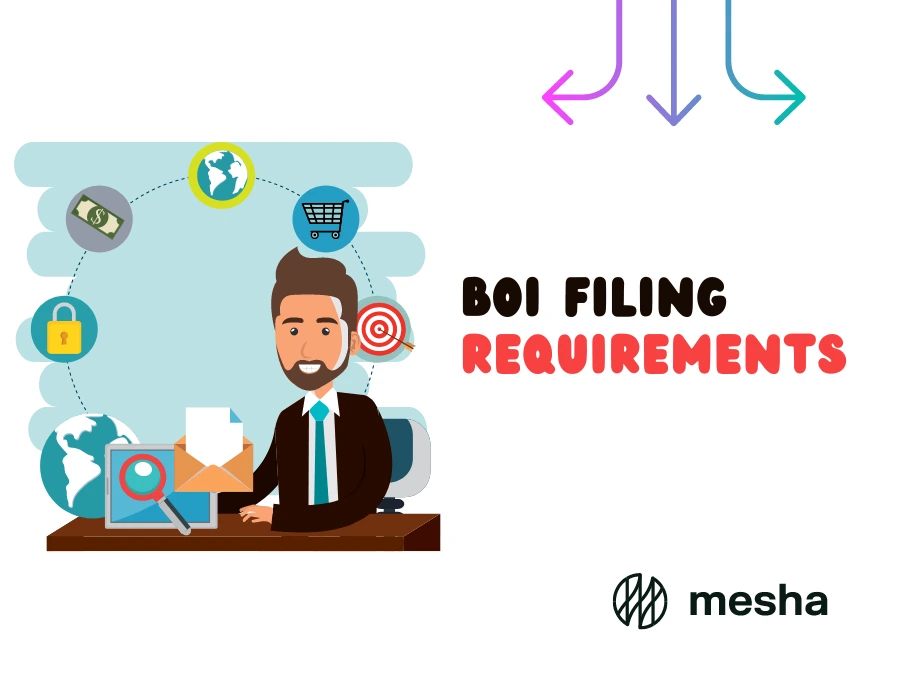Beneficial Ownership Information (BOI) Filing Requirements 2024-25 [Complete Guide]

Beneficial Ownership Information (BOI) filing shines a light on who owns businesses. It helps stop financial crimes by making ownership clear. Knowing about BOI keeps your business in line with the law and honest.
Table of Contents
Understanding BOI Filing Basics
The Corporate Transparency Act (CTA) plays a big role here. It tells certain companies to report who owns them to the Financial Crimes Enforcement Network (FinCEN). This stops people from hiding behind fake companies, making business clearer and safer.
Here’s what you should know about BOI filing:
- Purpose: It makes business ownership clear and fights illegal money moves.
- Requirements: Companies must say who really runs the show.
- Impact: It helps keep the country safe by stopping people from using businesses for bad things.
When you file BOI, you help make business fairer and clearer for everyone. It builds trust and keeps you following the rules. Knowing these basics helps you handle the legal stuff and run your business openly.
What is Beneficial Ownership Information (BOI) reporting?
BOI reporting is a new federal requirement under the Corporate Transparency Act (CTA) that requires many companies to report information about their beneficial owners—the people who ultimately own or control the company to the Financial Crimes Enforcement Network (FinCEN).
Also Read: What is financial reporting software?
Who Needs to File BOI Reports
Entities classified as ‘reporting companies’ under the Corporate Transparency Act (CTA) need to file Beneficial Ownership Information (BOI) reports. This includes most privately held companies registered to do business in the U.S., such as LLCs. Understanding whether your business falls under this requirement is crucial to avoid penalties.
Some entities are exempt from filing. Here’s a quick rundown:
- Publicly Traded Companies: Already registered with the SEC, so they’re off the hook.
- Large Operating Businesses: If you’ve got over 20 full-time employees and $5 million in gross receipts, you might not need to file.
- Certain Nonprofits: Some may qualify for specific exemptions.
- Inactive Entities: If you’re not actively doing business, you might be exempt.
Referencing FinCEN’s compliance guide can help clarify these exemptions. Knowing if your business needs to report keeps you aligned with the law. For those interested in enhancing compliance and efficiency, exploring the role of AI in accounting can provide insights into how automation can streamline financial operations. It ensures you’re aware of your obligations and any exceptions that might apply. Stay informed to manage your compliance smoothly.
Key BOI Filing Requirements

To file a Beneficial Ownership Information Report (BOIR), you need specific details about your company’s beneficial owners. This ensures transparency and legal compliance.
Here’s what you need:
- Full Legal Name: Provide the complete legal name of each beneficial owner.
- Business Address: Include the primary business address.
- Jurisdiction of Formation: Note where your company was legally formed.
- Taxpayer Identification Number: Add the relevant taxpayer ID.
- Owner Details: For each beneficial owner:
- Full Legal Name: Again, ensure accuracy here.
- Date of Birth: Record the exact date.
- Residential Address: Provide the current address.
- Identification Document: Use a passport or U.S. driver’s license for verification.
A beneficial owner is someone who owns or controls at least 25% of the company or has significant influence over decisions. This includes major decision-makers or senior officers.
Accuracy and completeness in your BOIR are crucial. Errors can lead to legal issues, so double-check everything. Collecting the right information keeps your business aligned with regulations and builds trust. Make sure all details are precise to avoid any compliance hiccups. For more information on how automated solutions can assist in managing financial operations and compliance, explore AI-powered invoicing solutions that streamline processes and enhance efficiency.
Timelines and Penalties for BOI Filing
Meet BOI filing deadlines to avoid penalties. Here’s what you need to know about timelines and consequences.
Filing Deadlines:
- Existing Businesses: Formed before January 1, 2024, must file by January 1, 2025.
- New Businesses (Post-January 1, 2024): File within 90 days of formation notice.
- New Registrations (After January 1, 2025): File within 30 days of creation.
Penalties for Non-Compliance:
Missing these deadlines can lead to serious consequences.
- Civil Penalties: Up to $591 per day for late filing.
- Criminal Penalties: Potential imprisonment up to two years and fines up to $10,000 for willful non-compliance.
Timely and accurate filing is crucial. Implementing strategies to ensure clients pay faster can also help maintain healthy cash flow, reducing stress associated with financial penalties. Staying informed about these requirements helps you avoid financial and legal trouble. Being proactive in your compliance efforts ensures smooth operations and legal peace of mind.
Final Thoughts on BOI Filing

Understanding BOI filing is about clarity and compliance. Knowing who needs to file and what details are required ensures your business stays on the right side of the law. Filing accurately and on time protects against penalties and enhances transparency.
Being aware of deadlines is crucial. Filing late can lead to costly penalties. Staying informed about changes in regulations helps you keep up with your obligations.
Also Read: How to file taxes as an LLC
The importance of compliance goes beyond just following rules. It builds trust and protects your business from financial crimes. Keeping your information accurate and up-to-date reflects a commitment to honest operations.
This isn’t just about ticking boxes; it’s about safeguarding your business and contributing to a fairer business environment. By staying proactive and informed, you ensure smooth operations and peace of mind.
FAQs On Beneficial Ownership Information Reporting
Which companies must file BOI reports?
Reporting companies include:
- Most corporations
- Limited Liability Companies (LLCs)
- Limited partnerships
- Business trusts
- Most other entities created by filing with a secretary of state
Are there any exemptions on BOIR?
Yes, there are 23 types of exempt entities, including:
- Large operating companies (>20 full-time employees, >$5M revenue, physical presence in US)
- Banks and credit unions
- Public companies
- Tax-exempt organizations
- Insurance companies
- Accounting firms registered with PCAOB
What are the filing deadlines?
- Companies created/registered before January 1, 2024: Must file by January 1, 2025
- Companies created/registered in 2024: Must file within 90 days of formation/registration
- Companies created/registered after January 1, 2025: Must file within 30 days of formation/registration
What happens if there are changes to reported information?
Companies must file updates within 30 days of any change in previously reported information.
What information must be reported about the company?
- Company name (including trade names/DBAs)
- Current street address
- Jurisdiction of formation
- Taxpayer Identification Number (TIN)
What information must be reported about beneficial owners?
For each beneficial owner:
- Full legal name
- Date of birth
- Current residential address
- Unique identifying number (from passport, driver’s license, or other approved document)
- Image of the document providing the identifying number
What constitutes “substantial control”?
Individuals with substantial control typically include:
- Senior officers
- Those with authority over important decisions
- Those with substantial influence over important matters
- Board members with substantial influence
What are the penalties for non-compliance?
- Civil penalties: Up to $500 per day while violation continues
- Criminal penalties: Up to $10,000 fine and/or imprisonment up to 2 years
- Both civil and criminal penalties may apply
How do I file a BOI report?
- Reports must be filed electronically through FinCEN’s BOI E-Filing System
- No paper forms are accepted
- Companies can file directly or through authorized representatives
Is there a filing fee?
No, FinCEN does not charge any fees for filing BOI reports.
What if I need to correct a report?
If you discover an error in a filed report:
- File a corrected report as soon as possible
- Include all required information, not just the corrected items
- Maintain records of original and corrected filings


